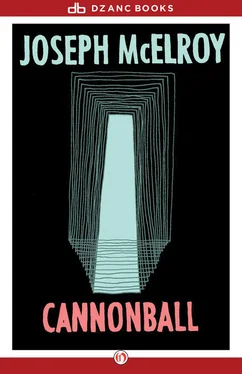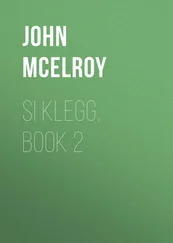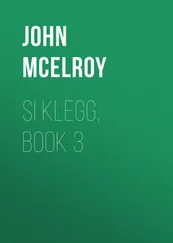Joseph McElroy - Cannonball
Здесь есть возможность читать онлайн «Joseph McElroy - Cannonball» весь текст электронной книги совершенно бесплатно (целиком полную версию без сокращений). В некоторых случаях можно слушать аудио, скачать через торрент в формате fb2 и присутствует краткое содержание. Год выпуска: 2013, Издательство: Dzanc Books, Жанр: Современная проза, на английском языке. Описание произведения, (предисловие) а так же отзывы посетителей доступны на портале библиотеки ЛибКат.
- Название:Cannonball
- Автор:
- Издательство:Dzanc Books
- Жанр:
- Год:2013
- ISBN:нет данных
- Рейтинг книги:5 / 5. Голосов: 1
-
Избранное:Добавить в избранное
- Отзывы:
-
Ваша оценка:
- 100
- 1
- 2
- 3
- 4
- 5
Cannonball: краткое содержание, описание и аннотация
Предлагаем к чтению аннотацию, описание, краткое содержание или предисловие (зависит от того, что написал сам автор книги «Cannonball»). Если вы не нашли необходимую информацию о книге — напишите в комментариях, мы постараемся отыскать её.
continues in McElroy's tradition of intricately woven story lines and extreme care regarding the placement of each and every word. A novel where the sentences matter as much as the overall story.
Cannonball — читать онлайн бесплатно полную книгу (весь текст) целиком
Ниже представлен текст книги, разбитый по страницам. Система сохранения места последней прочитанной страницы, позволяет с удобством читать онлайн бесплатно книгу «Cannonball», без необходимости каждый раз заново искать на чём Вы остановились. Поставьте закладку, и сможете в любой момент перейти на страницу, на которой закончили чтение.
Интервал:
Закладка:
“But the last part,” The Inventor looked up to see E-m, “where the Man from Nazareth speaks about the woman’s cohabiting sex part narrs, is not in the Scrolls they have published.” The Inventor turned upon me eyes glitteringly darker and because foreign now all the closer to me his young friend. “I know it for a fact. Can your papyrus be authentic?”
The phone went. We heard it like a voice, a face, a reply, something right in the neighborhood. Should he answer it?
What did I owe him, please?
With the hand that held the Scroll scrap and the grocery-bag brown paper translation, our host pointed to the Coaches Directory ( Big as a phone book , Milt had said): “It’s yours. Take it. It is bad luck. We help them, then one day they don’t confide any more. Therein is why Umo came here to…” (I took both pieces of paper out of The Inventor’s hand as he turned away distracted.) “…to our part of the world,” he added. “His place is marked.” The phone call might be about us, I thought; for us. “Be back,” The Inventor said politely, going to take it.
What were they willing to do to protect the Scrolls? Was it from higher up? A height from which nothing real is felt? Unreal becomes real when it hits you.
I hugged Cheeky, her feelings, her bones; and what was left of her was what I smelled, garlic and orange and bread, her well-used skin, the coffee churning in her stomach that had passed through her mouth — and the frankness of her grip, the earth of weeds and iron. “We’re outa here,” I said.
Who was the one who was dead but was thought to be living? I heard her ask, as I got the door open. She was holding the Directory against her. My brain is in the street, my hand on E-m’s arm, I see that I will go back to the war.
My Specialist driver tells the tale of her car parked down the street. She had checked on it every little while. Stood back from the office window, smelling the captain somewhere. She was parked at an angle between a mud-matte Humvee and an old truck with double-plated steel siding a local pickup could never have supported, welded at Camp Warhorse up in Baqubah forty miles from here. The captain calls her. Three boys stop to look at the Chevy, her old Suburban, and the boy at the hood glances up uncannily at her window and the other two lay hands on the doors and the driver’s door gives way (she can hear it even from here — and I want to know what the captain called her) and the boy is inside in a second leaning across the front seat, and the whole car blows and the boy at the hood is tossed against a wall fifteen feet back from the curb and the boy at the passenger door is aflame and not going anywhere, slowed down he looks darkly absorbed in the material of the car. She steps forward to the window (had he flipped the ignition even?). The captain wanders in and watches with her. His smoky hand on her shoulder, she resists a gentle pressure encouraging her to lean back. Did she have anything in the glove? The trunk, the back? — he might be asking something else. Is he kidding? “Do you not understand those boys didn’t do it? They only tripped a wire (but where?). Car was waiting for me to open the door and get in, me. Who would do that?” “No one. It’s the car,” said the man who had procured it and will procure a better one but thinks about it. Has she only one name?
A story to tell my sister one day — it won’t have happened yet; though if about to, here to her beloved Honda, foreseen too catastrophically late — fuse wrapped into exhaust manifold is one way, drive around for a while let the charge warm up; though you can trip a car bomb with a phone and Em’s cell sounds the first notes of the Fifth Symphony then caller hangs up as she thumbs Speaker — her notebook half under my foot, clothes and books in back, bicycle seat and half-empty suitcase in the trunk.
My sister said: “So he was dead, the Chaplain.”
She knew that, I said.
“How come they didn’t? They’re trying to silence a witness to the explosion — no, two explosions, you said—… Zach? — the second” (she thought a second) “…like a corroborating witness (!) — but all this time he’s dead somewhere (?). Why wasn’t he found?” My sister, looking through the windshield, eyeing the rearview, would answer for herself: “Because you took him with you. You were friends because you said you’d take him with you.”
Other way round, I said, I — Alive or dead, she said. I said I hardly knew why I hadn’t told her. Not the first time, she said.
The fewer who knew the better, but tell her of all the people in the universe, I hardly knew why I couldn’t when I was getting us into the water his body coming apart almost before I could haul him across the floor to the edge so when I dropped into the water he came down on top of my head.
It didn’t matter, Em said. “On top of you?” She’s amused, almost not there with me for once. I could feel the abyss, was it above or was it below? It’s hard enough to make it in alone without somebody else unloading on you…and your ear all taped. She wanted to kiss, I knew. She slowed and turned and I leaned and kissed her at a slant and her mouth was moist and tasted of nothing but her.
Unloading ? It sounded like something else. I hadn’t wanted her to see me lugging a body and then losing the body. “Water,” I said, “wait a sec—”—someone’s voice in you survives their death—“‘Water makes many Beds,’” I began. Em went on, “‘For those averse to sleep — Its awful chamber open stands…’” Her mood again, her agenda today. I wondered how well I’d done at the Hearings.
“It was good of you, Zach.”
Beethoven’s Fifth false-alarming again, Who’s that? she murmured, and may have forgotten to ask what became of my cargo, my saved dead man, my attempted cross-chest carry, for she made a zigzag of residential blocks, she enjoyed it, a new route. The car was a mess inside, but she could drive, the tiny white scar on her right wrist came into view. Passed a couple of Craftsman houses. “I won’t miss it; everyone wants to live here.” She might drive East or sell the car. We passed the bus. “You won’t sell your Honda,” I said. What were we talking about? Were we putting off getting downtown or finding the way there? The Hearings, I said. I thought they went well for me but maybe not.
I was thinking out loud, Em too, driving, and together we’re more prophetic it comes to me (and from the future) yet never again quite the couple. A trade-off, and we passed a playground with ceramic figures you entered and looked out of the eyes and mouths of — like Tarot, Em said (specific reference like her poets always with her — someone who’d actually built such things) — and then, “We temples build with human faces,” which made sense; we passed a school and a woman in shirtsleeves was leaning way out a window, and in a residential street a horse, a good sturdy quarter horse, a long cowboy sitting him, they seemed not to move and yet were headed in the other direction from us, the man’s hands resting the reins on a snakehead pommel and I in this weird profit-stricken country like a great war-torn…body, I had said to the lost voice at the back of the Hearings room and what had he said? — that I didn’t quite mean it with all my something or other I didn’t get back to him; we passed a dumpster of rubble and fill and old painted planks and bare-ticking pillows and pure garbage waiting for pickup, and in our conversation maybe Em glad to have the windshield to keep her eyes looking through and the rearview: “The fresh paint ‘n all, Umo’s gotta be somewhere.” “Inventor’s hanging on.” “How does he live?” “Hard to see how they’re plugged in.”
Читать дальшеИнтервал:
Закладка:
Похожие книги на «Cannonball»
Представляем Вашему вниманию похожие книги на «Cannonball» списком для выбора. Мы отобрали схожую по названию и смыслу литературу в надежде предоставить читателям больше вариантов отыскать новые, интересные, ещё непрочитанные произведения.
Обсуждение, отзывы о книге «Cannonball» и просто собственные мнения читателей. Оставьте ваши комментарии, напишите, что Вы думаете о произведении, его смысле или главных героях. Укажите что конкретно понравилось, а что нет, и почему Вы так считаете.












